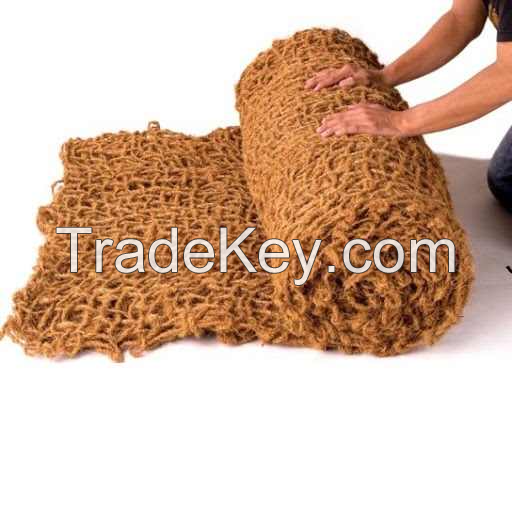




FOB Price
Get Latest Price6.5 ~ 8.5 USD / Roll ( Negotiable )
|1000 Roll Minimum Order
Country:
Vietnam
Model No:
Tracy Coconut net - D387
FOB Price:
6.5 ~ 8.5 USD / Roll ( Negotiable ) Get Latest Price
Place of Origin:
Vietnam
Price for Minimum Order:
6.5 per Roll
Minimum Order Quantity:
1000 Roll
Packaging Detail:
customer's request
Delivery Time:
10 to 15 days
Supplying Ability:
10000 Roll per Day
Payment Type:
Western Union, L/C, T/T
Product Group :
Overview Coconut net, also known as coconut coir netting, is a versatile and eco-friendly product made from natural coconut fibers. Sourced from the husks of coconuts, this net is a biodegradable and sustainable solution widely used in agriculture, horticulture, erosion control, and landscaping. Its natural strength, durability, and environmentally conscious properties make it an ideal choice for a variety of applications.
Material and Manufacturing Process The coconut net is crafted from **0% natural coconut coir, a fibrous material found between the hard shell and the outer coat of a coconut. The coir is processed and woven into strong, durable mesh. This traditional process involves cleaning, drying, and spinning the coir fibers into yarns, which are then handwoven or machine-woven to form netting of various sizes and thicknesses. The manufacturing process is chemical-free, ensuring that the product remains eco-friendly and safe for the environment.
Key Features
Natural and Sustainable: Made entirely from renewable coconut fibers, the net is biodegradable and decomposes naturally over time, contributing to soil health.
Durability: Coconut coir fibers are known for their toughness and resistance to wear, ensuring the net has a long lifespan in outdoor conditions.
Versatility: Available in various mesh sizes and thicknesses, the coconut net can be customized to suit different applications.
Eco-Friendly: Free from harmful chemicals, the product is safe for the environment and promotes sustainability.
Water Retention: The coir material retains moisture, which is beneficial for agricultural and horticultural applications.
Applications The coconut net is widely used across multiple industries and for various purposes, including:
Erosion Control: Coconut nets are commonly deployed on slopes, riverbanks, and construction sites to prevent soil erosion. The mesh holds soil in place while allowing water to pass through, stabilizing the area.
Agriculture and Horticulture: The net is used to support climbing plants like beans, cucumbers, and tomatoes. It also provides a natural base for growing crops in greenhouses or nurseries.
Landscaping and Gardening: Coconut coir nets are ideal for creating green walls, roof gardens, and mulching. They add a natural aesthetic to landscaping projects while promoting plant growth.
Rehabilitation Projects: The biodegradable nature of coconut nets makes them suitable for ecological restoration projects, such as reforesting degraded land or restoring coastal areas.
Construction: Used in road construction and embankments, coconut nets enhance soil stability and provide a natural alternative to synthetic materials.
Advantages of Coconut Net
Eco-Conscious Choice: Coconut nets contribute to a greener planet by offering a sustainable alternative to plastic and synthetic materials.
Improves Soil Quality: As the net decomposes, it enriches the soil with organic matter, promoting healthy plant growth.
Cost-Effective: With its long lifespan and multiple uses, the coconut net is a cost-effective solution for many industries.
Wide Availability: The natural abundance of coconut trees ensures a steady and reliable supply of coconut coir, making it an accessible product globally.
Customizable: Manufacturers can produce coconut nets in varying mesh sizes, thicknesses, and lengths to meet specific needs.
Specifications
Material: **0% Natural Coconut Coir
Mesh Size: Available in a range of sizes (customizable upon request)
Thickness: From 5mm to *0mm or more
Length: Typically available in rolls of *0m, *0m, or as required
Weight: Varies depending on dimensions and thickness
Color: Natural brown (unbleached)
Packaging and Shipping Coconut nets are rolled and securely packed for easy handling and transport. They are typically shipped in bulk quantities, with each roll wrapped in protective material to prevent damage during transit. Custom labeling and packaging options are available based on the buyers requirements.
Why Choose Coconut Nets from Vietnam? Vietnam is one of the worlds leading producers of coconut-based products, known for its high-quality coir fibers and skilled craftsmanship. Vietnamese coconut nets are renowned for their superior durability and excellent finishing. Additionally, the countrys commitment to sustainable production practices ensures that buyers receive eco-friendly products that meet international standards.
Ideal Markets The coconut net is suitable for export to countries focusing on sustainable development and environmental conservation. Key markets include:
Europe: Widely used in eco-conscious landscaping and gardening projects.
North America: Popular in agriculture and soil erosion control.
Asia-Pacific: Essential for horticulture and coastal restoration projects.
Middle East: Employed in landscaping and construction projects.
Conclusion The coconut net is an eco-friendly, versatile, and cost-effective solution for various industrial and environmental applications. Its natural properties, durability, and sustainability make it a preferred choice for businesses and projects worldwide. By choosing coconut nets from Vietnam, buyers are assured of high-quality products backed by reliable supply chains and sustainable manufacturing practices.
| Country: | Vietnam |
| Model No: | Tracy Coconut net - D387 |
| FOB Price: | 6.5 ~ 8.5 / Roll ( Negotiable ) Get Latest Price |
| Place of Origin: | Vietnam |
| Price for Minimum Order: | 6.5 per Roll |
| Minimum Order Quantity: | 1000 Roll |
| Packaging Detail: | customer's request |
| Delivery Time: | 10 to 15 days |
| Supplying Ability: | 10000 Roll per Day |
| Payment Type: | Western Union, L/C, T/T |
| Product Group : | agriculture |



